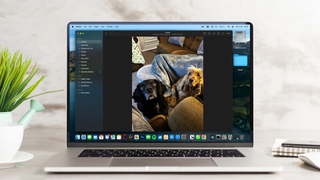macOS 15 wishlist: four ways Apple could steal Windows 11 fans' hearts at WWDC 2024
How Apple could tempt Windows users to switch at WWDC 2024

The Windows vs Mac debate still rages on, but with WWDC 2024, Apple’s annual conference for developers, about to kick off, we’ve been wondering what Apple could do to tempt Windows users to cross the divide.
Now, I’m not saying Apple will ever do these things, but I think they would give Windows users an extra reason to consider a device running macOS - and with many people getting increasingly frustrated with the direction Microsoft is taking Windows 11 in (the upcoming Recall feature is the latest controversy), WWDC 20204 could be a fantastic opportunity for Apple to tempt people to switch to one of the best Macs or MacBooks when they’re looking for a new computer.

1. Allow users to install macOS to run natively on Windows PCs
At present, if you try to do this and create what is known as a ‘Hackintosh’, you’ll be violating Apple’s End User License Agreement, as PCTechKits points out.
I understand that Apple wants to maintain macOS’s exclusivity to only run on Apple products (legally), but giving Windows users the option to install macOS without having to buy a new device would be a straightforward way to offer existing Windows users a path to trying macOS.

2. Make it easier for developers to create apps that can run on macOS
Sadly, there are still times when you’ll run into instances of software that doesn’t have a version for macOS or that the macOS version behaves differently from the Windows version.
While you can sometimes get around this by using compatibility layering programs like Wine or virtualization software that allows users to emulate other devices within your operating system, this often requires some technical knowledge or is resource-intensive, and if macOS made this easier to do, more Windows users might consider using macOS.
Developments like this would give users confidence that their files would be supported cross-platform and apps that they love would be supported, making it smoother to transition from Windows to macOS. Apple has also shown that it can do this sort of thing with its Rosetta 2 tool, which allows apps made for Intel-based Macs to run on modern ARM-based Macs with minimal impact on performance.

3. Develop macOS and Mac devices’ gaming capabilities
Similarly to the above point, part of why the macOS gaming experience is considered inferior by many is that there are fewer versions of gaming titles for macOS. If Apple can get more game makers to create versions of their games that can run on macOS natively, it could potentially encourage users who use their devices for gaming to switch to Mac, although many of the improvements that could be made are more hardware-related such as Mac devices having adequately powerful GPUs and better thermal management.
The good news is that MacBook Pros with M3 Pro and M3 Max chips have already proved that Apple can certainly make laptops capable of running modern, graphically intensive, games.

4 Give users control over whatever AI features Apple has up its sleeve
It’s heavily rumored that Apple will be talking a lot about artificial intelligence at its WWDC 2024 keynote, so I’d like to see Apple offer users the option to turn off any AI feature easily when they’re added and continue making functional quality-of-life improvements to macOS (allowing for these to be AI improvements when appropriate).
This is currently a commonly voiced complaint by Windows users, with Microsoft currently working on a campaign to get users to use new AI features such as Copilot in Windows 11.
Also, ultimately, a huge selling point of Windows is that it’s offered on a large, diverse range of hardware. Apple’s approach is completely opposite in this respect and I think if it wanted to seriously challenge Microsoft in the arena of PC operating systems, it would have to consider relaxing this, but I feel that will never happen.
Again, this is all easier said than done and more of a wishlist than a realistic expectation, but WWDC 2024 is an opportunity for Apple to surprise people. Even if Apple refuses to legally allow users to run macOS on non-Apple devices, there are things it could do and changes it could make to give Windows users a real case to consider making the switch to a Mac device.
YOU MIGHT ALSO LIKE...
Get the best Black Friday deals direct to your inbox, plus news, reviews, and more.
Sign up to be the first to know about unmissable Black Friday deals on top tech, plus get all your favorite TechRadar content.
Kristina is a UK-based Computing Writer, and is interested in all things computing, software, tech, mathematics and science. Previously, she has written articles about popular culture, economics, and miscellaneous other topics.
She has a personal interest in the history of mathematics, science, and technology; in particular, she closely follows AI and philosophically-motivated discussions.
Most Popular

